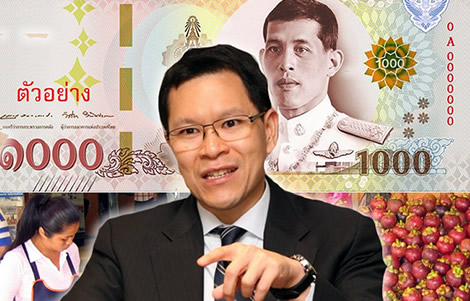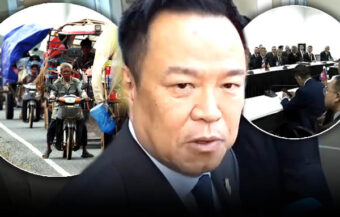Thailand’s export industry has been ravaged by the US-China trade war that is now threatening to provoke an economic setback. The move today could be timely in addition to regulatory curbs in July on speculation in the baht. The promised government stimulus package and an increase in public capital expenditure is now urgently needed to keep the Thai economy at least moving forward.
Thailand’s Bank of Thailand cut its interest rate by 25 basis points on Wednesday in a surprise move which shows the challenge facing the country at this time from what is now an all-out economic war between the United States and China. As reported on the Thai Examiner on Monday, one bank, ING, predicted the rate cut while also suggesting Thailand’s growth rate will be lower than forecast by its peers for 2019. It has also predicted a 2nd rate cut by the end of the year.

The Bank of Thailand cut its key interest rate on Wednesday by 25 basis points to 1.5%. This was against expectations from an earlier published poll by Reuters but one bank, ING based in Thailand and Singapore, got it right. The same bank is also predicting that Thailand’s growth rate will be lower this year than other institutions and has also predicted a second interest rate cut in Thailand by the end of the year.
Devaluation of the yuan in addition to economic data may be behind the surprise cut
While the cut surprised many in Bangkok as 14 out of 15 participants in the Reuters survey had said otherwise, it really should not be so surprising given the development on Monday when the US labelled China a currency manipulator following the effective devaluation of the Chinese Yuan over the weekend. China is Thailand ’s largest export market just ahead of the United States and the lower yuan combined with the heightening tensions between Beijing and Washington signals, unfortunately, even bigger trouble for Thailand’s export drive. The Industry Ministry Suriya Juangroongruangkit on Monday speaking at a business forum called on the Bank of Thailand to act. It appears they may have beem listening at least to what the data is telling them. The Thai economy is in trouble and needs timely intervention.
Bank of Thailand has shown itself to be willing and able to act, the baht lost ground in July
The move by the Bank of Thailand in July to curb speculation in the baht was well thought through and worked. However, the raised US-China tensions and the US Fed’s announcement of an interest rate cut in the United States further primed the pump for more inflow into Thailand’s bond market which was already, quite unusually, seeing rates below the Bank of Thailand’s official rate in recent days. The baht lost 0.7% against the dollar in July and was the worst-performing Asian currency for the month. Today’s cut in addition to July’s regulatory move shows that the Thai central bank is both willing and quite able to act.
China and the US now engaged in economic warfare – Thailand is a key casualty
The great fear for Thailand right now is a real polarisation between the US and China which went to a new level with the imposition of further tariffs announced by US President Donald Trump on August 1st. The two great powers are now openly engaged in economic warfare and Thailand is a casualty more so that anyone could have predicted at the outset.
The move to devalue the yuan by the Chinese will also hit Thailand’s exporters not only in China but in Asian markets where Chinese goods may be dumped because of the trade war and their inability to sell stateside.
Bank of Thailand will come under pressure to take further action if baht does not weaken
While the central bank will monitor the effects of the interest rate cut, for now, it will come under further pressure if the baht does not back down against the dollar and the Chinese Yuan. This is still thought unlikely because of Thailand’s strong fundamentals including a lower borrowing to GDP ratio as many bankers and financial fund managers have begun to eye the possibility that any potential financial crisis may tend, the next time around, to involve sovereign players as opposed to financial institutions.
The raising of stakes in the US-China trade war
The first week of August has seen a strong increase in the challenges being faced Thailand’s exports and its overall economy. Many analysts see the potential for even further tariffs between the US and China.
US China trade war will get worse
Martin Petch is a Vice President of Moody’s which upgraded Thailand’s sovereign and bank ratings in July. He feels that the trade war is going to get worse and that it will hit Asia particularly hard. ‘Unless negotiations between the US and China resume rapidly, this latest development is likely to create negative spill-over effects in both China, the US and globally, and particularly in Asia,’ he said this week in the aftermath of the yuan devaluation.
Fears for Thailand’s electronic sector after the latest moves from Chian will hit it hard
Meanwhile, Thailand’s National Shipping Council Chairwoman, Ghanyapad Tantipipatpong, has confirmed that the Chinese devaluation of the yuan is further bad news for exporters but says that her organisation has not yet examined the full implications. The Vice-Chairman, Visit Limlurcha, points out that it will automatically and clearly impact Thailand’s exports to China. He was also particularly concerned about the electronic sector which is responsible for huge numbers of jobs in Thailand.
Exports are contracting, they may now contract faster
We are already at a point where Thailand’s exports have been contracting month after month, this could prompt an escalation of that contraction. The Chairwoman said one of her biggest concerns was the Thai baht breaking through the ฿30 to the dollar figure. She intimated that this would bring to challenge to a whole new level.
Beijing move torpedoes Thai hopes of an upside to the trade spat as it creates further uncertainty
The move by Beijing effectively torpedoes government moves to attract factories and manufacturing to Thailand as an upside to the trade war. China has shown its teeth and this will make its manufacturers nervous about moving far afield. It is becoming increasingly clear that there is no upside in this situation for Thailand except the ability of the government to focus on what it can do within its own borders.
Central bank must tread carefully
This will mean increased pressure on the Bank of Thailand but it must also move carefully and confidently so as to maintain stability. The government’s economic stimulus package and the expediting of capital expenditure projects may also help.
Thailand’s Shipper’s Council calls for a Commerce Ministry war room to fight for exports
The Shipping Council is calling for the Commerce Ministry to set up a war room and for the government to commit not to make a move towards increasing the minimum daily wage while the private sector is in such turmoil as exports contract.
For further reading:
Moody’s – debt is 98.5% denominated in Thai baht as two views of the economy are at odds
Crunch for Thai economy as exports dive. Fears that Thai baht has become a focus of speculation
Thai baht is the key reason for the continued faltering of Thailand’s exports and cross border trade


















